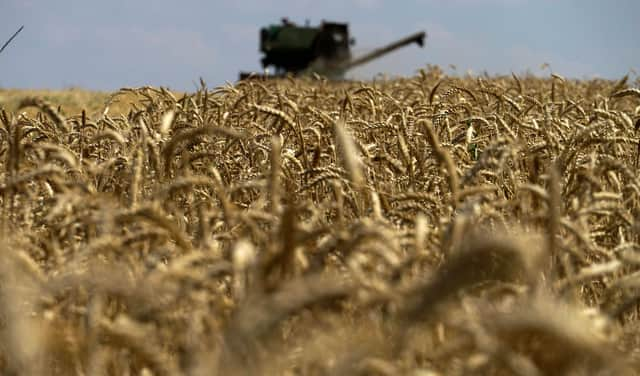Ian Ellis: The vicious global circle of conflict and food insecurity


Certainly, many governments, individuals and organisations of all kinds, including the churches, are trying to do what they can to combat hunger around the world.
Christian Aid, for example, partners with the UN’s World Food Programme (WFP). It says it does so because the WFP has “the operational ability, scale and resources to deliver assistance to those in greatest need”.
Advertisement
Hide AdAdvertisement
Hide AdEqually, Christian Aid says that the way it operates means it has “deep connections” with local communities in the developing world, so the charity’s local teams can direct aid where it is most needed.
It is clearly a sensible and pragmatic partnership.
The WFP states that currently 848 million people go to bed hungry every night, that 345 million people across 82 different countries are facing acute food insecurity, and that 50 million people in 45 countries are on the brink of famine.
The reasons for this shocking need lie to a large extent in wars, in what the WFP terms “climate shocks”, in the effects of the Covid pandemic, and in steeply rising energy costs.
In a recent interview with Foreign Policy journal editor-in-chief Ravi Agrawal, the former head of the WFP, Ertharin Cousin, commented: “What we need to remember is that some 25 to 30 percent, depending upon the year, of the wheat crop in the global food system is produced by Russia and Ukraine combined.”
Advertisement
Hide AdAdvertisement
Hide AdThe consequent high price of wheat, allied with the recent steep rise in the cost of fuels, makes the situation all the more difficult.
However, Ms Cousin sounded a more hopeful note, saying that everyone in the world could be fed if science and innovation were embraced.
She stated that in many countries there is actually underproduction of food because of a lack of seeds, equipment and infrastructure, adding: “And so as a result, about 40 percent of what is produced is actually lost before it reaches consumers because of lack of access to adequate roads, lack of access to storage, lack of access to refrigeration. So we have less food produced, and then we lose 40 percent of what’s produced.”
The need for investment in the necessary infrastructure is clear, so that developing countries are helped to help themselves and others too.
Advertisement
Hide AdAdvertisement
Hide AdHowever, compassion fatigue threatens the necessary action on the part of the developed world.
A document from the K4D organisation and prepared for the UK’s Foreign, Commonwealth and Development Office by Evert-jan Quak of the University of Sussex-based Institute of Development Studies (IDS), has observed both that conflict can affect food prices and that, vice versa, prices can exacerbate conflict.
Conflict and food insecurity form a literally vicious circle.
The IDS briefing also pointed out that climate change affects food availability “mainly through extreme and unpredictable weather conditions, affecting productivity of crops and livestock”.
Advertisement
Hide AdAdvertisement
Hide AdThe first post-invasion grain ship from Ukraine left on August 1 following a deal with Moscow, brokered by Turkey and the UN, to lift Russia’s blockade.
Speaking last week in Ukraine, UN secretary-general Antonio Guterres observed that since then 21 ships had departed from Ukrainian ports and 15 had left Istanbul for Ukraine to load up with grain and other food supplies.
The UN chief also underscored the urgency of reversing the turmoil in the global fertilizer market, which is currently threatening next season’s crops.
In fact, Russia’s war in Ukraine will leave this year’s Ukrainian harvest much reduced, perhaps by up to 30%, according to Chatham House food security specialist Laura Wellesley.
Advertisement
Hide AdAdvertisement
Hide AdNo one can be surprised that the devastation caused by the Russian aggression has led to this consequence.
It is estimated that some 60 per cent of Ukraine’s grain exports to top Ukrainian grain importing countries have been going to Egypt, Indonesia and Bangladesh together, but the plight of the people of one region, East Africa, has been particularly highlighted by Christian Aid.
The development charity has indicated that the situation in East Africa has seen millions of innocent children, women and men “taking desperate measures to survive in the face of extreme hunger, caused by failed harvests, livestock deaths and water shortage”.
Christian Aid indicates that the East Africa situation is due to the climate crisis and the Covid pandemic, with Russia’s invasion of Ukraine having amplified an increase in global food prices, piling one crisis on another for the beleaguered region.
Advertisement
Hide AdAdvertisement
Hide AdHow can those of us who live in Northern Ireland do anything to change these tragic world-wide circumstances?
There are at least three things we can do, in addition to prayer itself. Those are: first, informing ourselves; second, speaking to others about the issue, not least to those involved in political life; and third, simply donating with generous hearts to our chosen charities.
• Canon Ian Ellis is a former editor of The Church of Ireland Gazette.